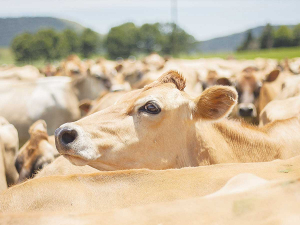Kiwi spearheads global Jersey strategy revamp
The global organisation for Jersey breeders has undergone a strategy refresh - spearheaded by new president and the first New Zealander to hold the post, Alison Gibb.
 Jersey Advantage claim Jerseys are outperforming other breeds at one large farming business in Waikato.
Jersey Advantage claim Jerseys are outperforming other breeds at one large farming business in Waikato.
In Jim and Debra Kirkham's Waikato-based farming operation, Jerseys are outperforming the other breeds, claims Jersey Advantage New Zealand.
The 582-cow Jersey herd, which is part of the wider Kirkham group, outperformed both their Friesian and crossbreed counterparts across a range of key performance indicators including production per hectare, production per cow, and farm working expenses.
The Jersey herd averaged 465 kgMS/cow - well over 100% of their liveweight - and 2068 kgMS/ha.
That was 4% higher than the Friesian herd and 11% higher than the crossbreed herd on a per cow basis, according to Jersey Advantage.
On a per hectare basis the Jersey's performance was even more impressive at 7% higher than the Friesian herd and 20% higher than the crossbred herd.
The Kirkham's farming business consists of four dairy farms milking over 2700 cows in total, as well as a calf rearing and grazing unit. Within the wider operation are three dairy farms all located in a close radius, 10km south of Te Awamutu.
"The cluster of three farns are within a stone's throw of each other. They are run under the same management and feed systems, with comparable contour and pasture growth which puts us in a unique position of being able to make these comparisons," says Brad Eyre, operations manager.
Brad, the Kirkham's nephew, joined the business 13 years ago, starting as a contract milker before progressing to operations manager in 2016. Brad admits that when he started with the Kirkham Group, he was not in favour of maintaining the Jersey herd. "When I first came to the farm I wanted to cross the Jersey herd," says Brad.
However, that didn't eventuate and now the group have a Jersey herd (Pepi Oaks), a Friesian herd (Allen Oaks) and crossbreed herd (Oakwood) as part of their home cluster at Tokanui, with a further dairy farm at Waiterimu, milking crossbreed cows.
The three central farms are stocked at a similar liveweight per hectare and have the same inputs including maize, palm kernel, kiwifruit, and grass silage.
While Jersey's efficiency is well proven, it is sometimes argued that the per animal costs associated with a higher stocking rate can offset the advantage. This is something that the Kirkham's figures challenge.
"Pepi Oaks has the lowest farm working expenses of all three farms in the cluster at $4.37/kgMS," says Brad.
The other two farms in the cluster have farm working expenses of $4.86 (Friesian herd) and $4.77 (crossbreed herd).
So, what sets the Jersey herd apart?
Jim believes that the quality of the herd has something to do with it but also puts the success of his Jerseys down to the efficiency of the breed and their suitability to their system 4 operation.
"Pepi Oaks sits comfortably within the top 5% of New Zealand herds for both breeding worth and production worth and was established by my father back in 1975 so there is a lot of history behind it."
Jim's Dad came to Te Mawhai in 1960 and originally milked shorthorns but after an outbreak of TB had to cull his herd, replacing it with Jerseys.
"Dad purchased a line of heifers from Hodable Farms who were the first people in New Zealand to do artificial breeding."
"It was a good line of stock and we continued the practice of artificially breeding yearlings, something we have done with all our herds."
The combination of Premier Sires and AB mating yearlings for 30 years has helped to drive genetic gain. Pepi Oaks have a breeding worth (BW) of 194 and a production worth (PW) of 220, while Allen Oaks (Friesian) has a breeding worth of 110 and production worth of 124, and Oakwoord (crossbreed) a breeding worth of 127 and production worth of 140.
The same approach to mating is taken with all three herds - with four weeks of AB followed by 4 weeks running bulls, and finishing with two weeks of short gestation semen. This year the farms will use sexed semen for the first two weeks of AB over the top 25% BW cows and put the bottom 20% to beef.
So, are there plans to convert to all Jersey? For now, the group is happy to have a foot in each camp when it comes to their breeding.
"These things tend to be cyclical, but right now we are very happy with the performance of our Jersey herd," says Brad.
"My grandad will certainly be happy I didn't cross the Jerseys."
One team with 43 head, including a contingent from Mid Canterbury, are reflecting on a stellar NZ DairyEvent.
Fonterra farmer shareholders have approved the mechanism for a $2/share capital return expected from the sale of its global consumer and associated businesses.
Trainees in the horticulture industry studying towards a certificate or diploma can now apply for Horticulture New Zealand's (HortNZ) 2026 Industry Training Scholarships programme.
OPINION: The first three Global Dairy Trade (GDT) auctions have been a morale booster for farmers.
Former Fonterra executive Alex Turnbull has been appointed CEO to lead all five Yili Oceania Business Division companies in New Zealand.
Fonterra executive René Dedoncker is leaving the co-operative later this year to lead Australian agribusiness Elders.
OPINION: Staying with politics, with less than nine months to go before the general elections, there’s confusion in the Labour…
OPINION: Winston Peters' tirade against the free trade deal stitched with India may not be all political posturing by the…